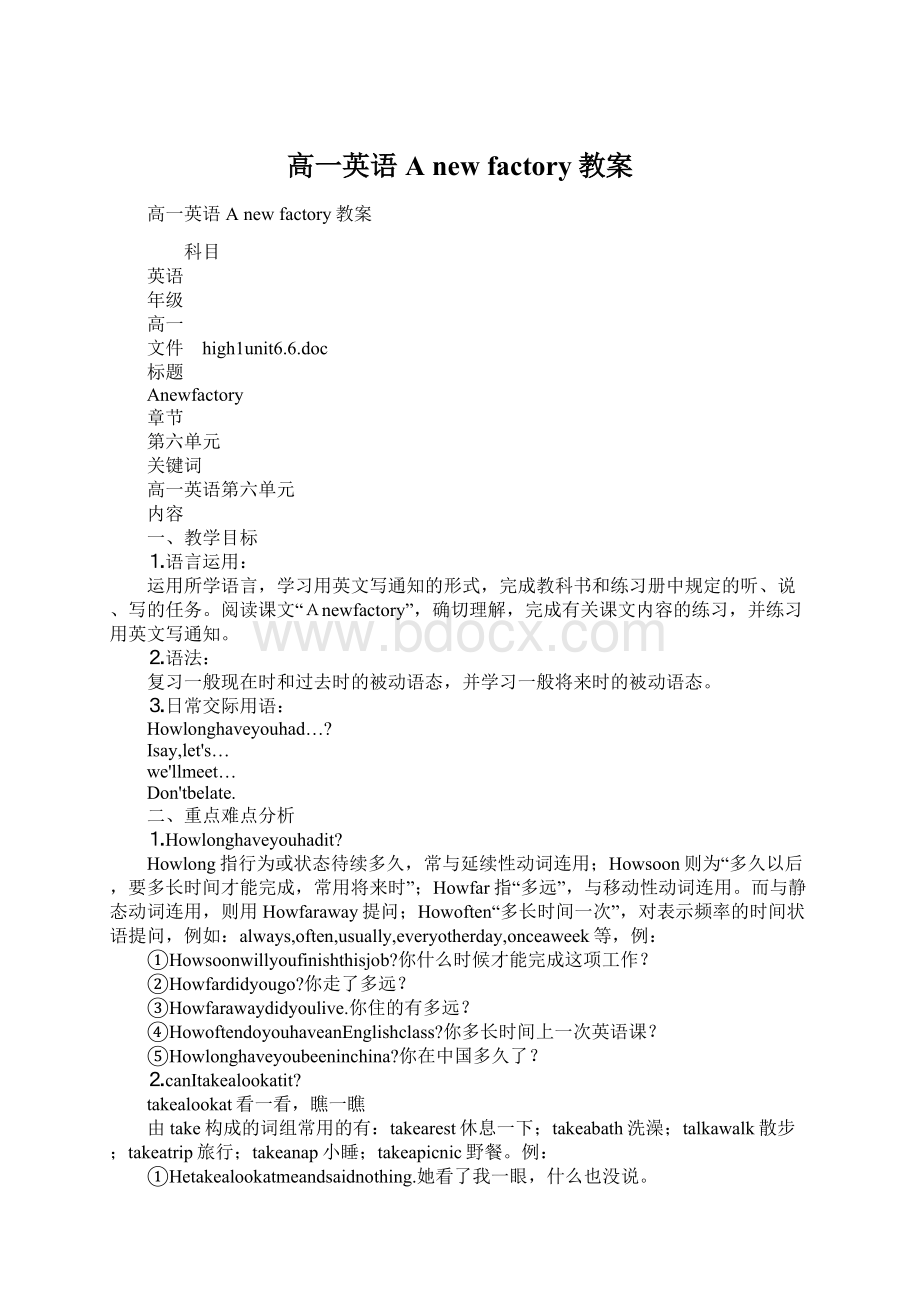高一英语A new factory教案Word文档下载推荐.docx
《高一英语A new factory教案Word文档下载推荐.docx》由会员分享,可在线阅读,更多相关《高一英语A new factory教案Word文档下载推荐.docx(5页珍藏版)》请在冰豆网上搜索。

we'
llmeet…
Don'
tbelate.
二、重点难点分析
⒈Howlonghaveyouhadit?
Howlong指行为或状态待续多久,常与延续性动词连用;
Howsoon则为“多久以后,要多长时间才能完成,常用将来时”;
Howfar指“多远”,与移动性动词连用。
而与静态动词连用,则用Howfaraway提问;
Howoften“多长时间一次”,对表示频率的时间状语提问,例如:
always,often,usually,everyotherday,onceaweek等,例:
①Howsoonwillyoufinishthisjob?
你什么时候才能完成这项工作?
②Howfardidyougo?
你走了多远?
③Howfarawaydidyoulive.你住的有多远?
④HowoftendoyouhaveanEnglishclass?
你多长时间上一次英语课?
⑤Howlonghaveyoubeeninchina?
你在中国多久了?
⒉canItakealookatit?
takealookat看一看,瞧一瞧
由take构成的词组常用的有:
takearest休息一下;
takeabath洗澡;
talkawalk散步;
takeatrip旅行;
takeanap小睡;
takeapicnic野餐。
例:
①Hetakealookatmeandsaidnothing.她看了我一眼,什么也没说。
②Don'
tyouwanttotakealookatmypictures?
你难道不想看看我的照片吗?
⒊Thebuildingofanewcarfactorywasagreedonlastmonthandanewcompanyhasbeenstarted.盖一座新汽车工厂的建议已于上周得到同意,一家新的公司已经开业。
agree一词的用法
▲agreeon在某方面或某一点达成协议或取得一致意见。
(宾语为表示具体协议的文件计划或行动等)如:
①wehaven'
tagreedonthepriceofthecomputer.就电脑的价格问题,我们还没有达成一致。
②Theyagreedonthatpoint.他们在那一点上取得一致意见。
▲agreeto…表示“同意”时,后面的宾语常为下列名词:
plan,suggestion,arrangement,proposal,opinion等,如:
①Iagreetotheplan.我同意这个计划。
②Sheagreedtomarryhim.她答案嫁给他。
▲agreewith…同意某人或某人说的话表示“与…一致”,“适合(气候、食物)”
①weallagreewithwhatyousay.我们都同意你的观点。
②Ididn'
tquiteagreewithyou.我不大赞同你的观点。
③Theverbagreeswithitssubjectinnumberandperson.动词的数和人称与其主语一致。
④Thiskindoffooddoesn'
tagreewithme.这种食品不合我的胃口。
⒋Anewfactorywillbebuilthere.
build,setup,found和putup
▲build“建立、建造、建设”,常指建大东西,如
buildaroad筑路
在表示建立一个商店、企业时,也可以用start和open.
Startafactory
▲setup“开办”“创立”,常和表示组织、机构、团体等意义的词连用,与found基本相同。
setupaschool
▲found“兴建”着重找基础,用基金创设
foundacity兴建一个城市foundatheory创立一个学说
▲putup着重指建造或搭起一个具有高度的具体物体,在口语中与setup和build相同
putupatent拾个帐篷
⒌Atleast30,000houseswillbebuiltfortheworkers.
leastn.最少(的东西),atleast至少反义词atmost
①Heisatleastasoldasyou.他至少和你一样大。
②Ihaveatmost10daysholiday.我的假最多10天。
⒍Thecarswillbesuppliedtopeoplealloverthecountry.
supplyn.供应品v.供应,提供
▲supplysth.tosb./supplysb.withsth.
①Bookssupplyuswithknowledge.
Bookssupplyknowledgetous.书本为我们提供知识
②Thegovernmentwillsupplytheneedformorehouses.
政府将满足人们对于房屋的需要。
▲agreatsupplyof大量的,beinshontsupply缺乏,供应不足
①Theycutoffallmedicalsupplies.他们切断了所有的医药供给。
②Nextweek,we'
llbereceivingagreatsupplyoffood.
下周,我们将收到大量的食物。
⒎spend,cost,take,pay,for,buy…for…
▲spend…onsth./spend…doingsth.主语一般是人,表示花钱和时间
①Shespentmuchofhermoneyonclothes.
她在衣服上花了很多钱。
②Hespenthissparetimehelpingthepoor.
他利用业余时间帮助穷人。
▲cost无被动语态,只能用事物的名词或代词作主语,不能用人作主语,表示花费金钱、时间、劳力等。
①Howmustdidthedictionarycostyou?
这本字典多少钱?
②Theworkcostthemmuchlabour.这件工作花费了他们很大的劳动。
▲take主要指花时间而言。
Ittakesb.Sometimetodosth.
①Ittookmethreehourstodrawthispicture.画这幅花用了我三个小时。
②Howlongdoesittakeyoutogotoschoolbybike?
骑车上学,你用多长时间?
▲pay…for…付钱买,主语必须是人。
①HepaidtendollarsfortheT-shirt.他花了10美元买这件T恤。
②Howmuchdidyoupaythedoctor?
你付给医生多少诊费?
▲buy…for买东西用多少钱
①Sheboughthreejeansfor180yuan.她用180元买了3条牛仔裤。
⒏Thereareplentyofoffices,factories…
plentyof大量的,可接可数名词,也可接不可数名词,但只限用于肯定句中,相应的疑问句和否定句分别用enough/many,much等,如:
①Ihaveplentyofbookstoreadonholidays.我有大量的书在假期里读。
②─Haveyouenoughmoneyforthetickets?
你们有足够的钱买票吗?
─yes,wehaveplenty.足够了
⒐Notallthepartsofthecarwillbemadeinthefactory.不是所有的汽车部件都在这家工厂制造。
=somepartsofthecarwillbemadeinthefactory,butsomenot.
当not与all,both,every,everyone,everything,always等词连用时,表示部分否定“并非都…”
而和no,none,noone,nobody连用时表示全部否定,例如:
①Noteveryonelikesthisbook.并不是每个人都喜欢这本书。
②Notallbirdswillflytothesouthinwinter.在冬季,不是所有的鸟都飞向南方。
③Bothofhisparentsarenotteachers.
④Noneofthemagreewithme.他们都不同意我的观点。
⑤Nowordscanexpressmythankstoyou.任何语言都不能表达我对您的谢意。
三、学写通知
书面通知又称通知或布告,是上级对下级,组织对成员部署工作、传达事情,召开会议所使用的一种文体,通告一般张贴在布告牌上,或显眼的地方,通告正文上方的正中位置NoTIcE(每个字母都大写),右下角写出通知的单位(也可写在NoTIcE的正上方),日期一般写在左下角,单位和日期也可以省略,通知不写称呼,也没有结束语,但在正文里,首先应提到被通知的对象,通知的内容包括对象、事由、时间、地点等,语言应简洁明了,条理清晰,要求明确,特别是时间概念很重要,要写得十分明确。
下面是一个通知的例子:
NoTIcE
StudentsofGrades1and2willgoforanautumnoutingonwednesday,october25th.wellgototheGreatwallfirstinthemorningandthenhavelunchthere.Intheafternoonwe'
llgotovisitthemingTombs.
Pleasebringyourlunchanddrinks.wearyoursportsshoesasweshalldoalotofwalking.Andbringmoreclothes,becauseitiscoolerontheGreatwallthanhere.we'
llmeetattheschoolgateat7:
00onwednesdaymorning.Pleasedon'
四、被动语态
被动语态的结构(部分)
时态
被动语态
例句
一般
现在时
助动词be的一般现在时+动词的过去分词
I'
moftenaskedtoanswersuchaquestion.
ourclassroomiscleanedeveryweek.
过去时
助动词be的过去时+动词的过去分词
Nobodywasallowedtoenterthebuilding.
weweregivensomegifts.
将来时
助动词be的将来时+动词的过去分词
XiaoHongwillbelookedofterbymrsLi.
Anewhospitalwillbebuilthere.
五、典型例题
⒈Asweknown,knowledgebegins_____practice.
A.withB.fromc.throughD.by
⒉They'
remadeuptheirmindsto______abasketballteam_____.
A.putup,oftheirownB.buildup,oftheirownone
c.setup,oftheirownD.madeup,oftheirown
⒊Thedictionauyisusefultothosewhoarelearningspanishas_____foneignlanguage.
A.thesecondB.secondc.asecondD.hissecond
⒋Thewholemorning_____thewindowsandthefloorstomorrow.
A.shallbespenttowashB.isgoingtotaketowash
c.willspendinwashingD.willbespentwashing
⒌______we'
veheard!
A.HowgoodnewsB.whatagoodnews
c.HowagoodnewsD.whatgoodnews
⒍Thenumberoftractorsmadeinfactoryeachyear______fivethousand.
A.hasgrownB.havegrownc.wasgrownD.havegrownto
⒎─Doyouhave_____timetodothework?
─No,Idon'
thave_____time.
A.enough,muchB.plentyof,much
c.enough,plentyofD.many,any
⒏Thefactory____us_____somepartsofthecar.
A.supplies…toB.supplies…for
c.supplies…ofD.supplies…with
⒐Thenaughtyboydoesn'
t_____muchtime_____hishomework.
A.spend,onB.take,onc.pay,forD.cost,to
⒑wecouldn'
teatinahotelbecause_____ofushad_____moneyonus.
A.all,noB.any,noc.none,anyD.noone,any
⒒Howlonghaveyou_____thismotorbike?
A.hadB.boughtc.gotD.borrowed
⒓Hetoldmehewouldnot_____forNewyorkuntiltheendofnextweek.
A.beginB.begoingc.beleftD.start
⒔maryhadanaccident______aDecemberafternoonwhentheroadwasveryicy.
A.inB.atc.onD.during
⒕Idon'
tknow_____shewillbehere.we'
vebeenwaitingforlong.
A.howoftenB.howlongc.howfarD.howsoon
⒖Arethesemachinesmade______japan?
A.inB.ofc.fromD.into
答案及解析
─5AccDD6─10AADAc11—15ADcDA
⒈beginwith以…开始正如大家所知的那样,知识于实践的。
⒉他们下决心组织一个自己的球队。
⒊thesecond是特指第二个,隐含条件只有一个且只能有这一个。
asecond是泛指第二个,可以是任何一个被放在第二位的人或物。
这本字典对于那些把西班牙语作为第二外语的人都很有用。
⒌news是不可数名词,一条消息应用apieceofnews
⒍Thenumberof表示“…的数目”用单数谓语动词
⒎见前讲解8
⒑Noone和none都表示一个都没有,但noone只指人不表物,后面不能接of,none既可表人又可表物,通常和of连用。
⒒完成时要与连续动词连用
⒓start还有“出发、动身”的意思,再如:
Atlastthetrainstarted.
⒔有定语修饰时morning,afternoon,evening前用介词on
⒕我不知道他什么时候才能到这儿,我们已经等了很多时间了。
⒖bemadein+place由哪制造